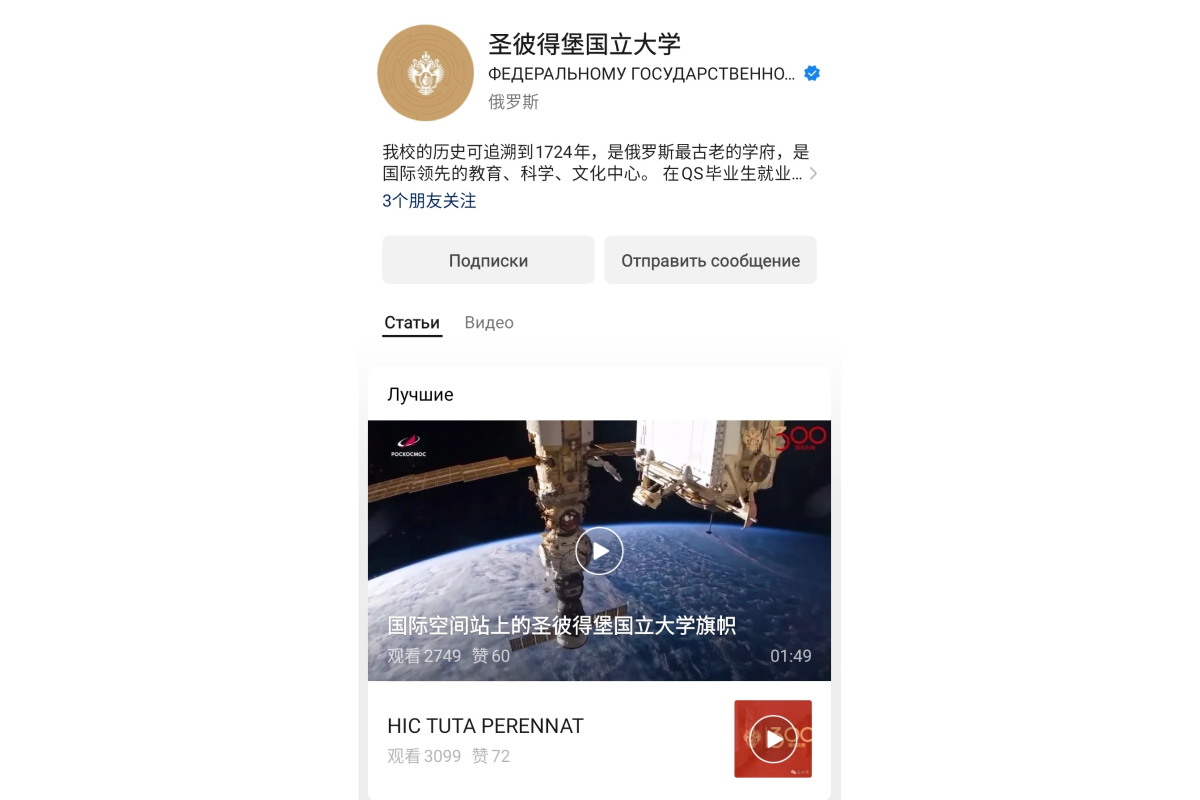Creative technologies from St Petersburg University captivate China
From February to May 2024, the Centre for Creative Technology in International Relations at St Petersburg University and the Marketing and Media Communications Department at St Petersburg University have been collaborating to launch and verify the St Petersburg University channel in Chinese on China’s largest platform WeChat.
The opening ceremony of the new University clinic, i.e. the Centre for Creative Technology in International Relations at St Petersburg University, was held as part of the St Petersburg International Scientific and Educational Salon in November last year. Second-year master’s students in "Public Relations as Part of International Relations" and "Artificial Intelligence and International Security" at St Petersburg University, even before the official opening of the new clinic, implemented a number of creative projects. Among them are the following: the video interview "Dialogue with a neural network", which was developed by eight different neural networks; and the chat bot "Foma", which provides useful information about studying the programme "International Relations".
The idea of the new project to launch and verify the St Petersburg University channel on one of the Chinese social media was suggested at the meeting with employees of the Marketing and Media Communications Department at St Petersburg University at the end of the last year, said Roman Liseev, Head of the Centre for Creative Technology in International Relations at St Petersburg University. Opening an account in another country is not easy, especially in China, where there are significant restrictions on collaborating with foreigners. The content of the St Petersburg University account was created by students as part of their clinical practice. They built up a student editorial team, which was led by Ekaterina Popova, a second-year master’s student in "Public Relations as Part of International Relations" at St Petersburg University.
"There are traditionally a lot of Chinese students in this programme. They make more than a half of the total body of students in the programme. They took part in developing the content in Chinese. The posts that Russian-speaking students prepared were then translated into Chinese," explained Roman Liseev.
Ekaterina Popova was engaged in planning and coordinating the work of the student editorial office, gave assignments, collected and edited materials, and summed up the results every week. Chinese students were engaged in translations of texts, photography and video shooting of stories. For them, this was practical work in their specialty in a clinic format, and Roman Liseev was their supervisor of practical training.
I studied in the bachelor’s programme "International Journalism" at St Petersburg University. What I have been doing as part of the project is familiar to me. Roman Liseev invited me to take part in the editorial work. In this project, international relations students worked in three areas: "Academic environment", "Cultural diplomacy", and "Student creativity", which is my section. We wrote posts about hobbies, nature, leisure, our impressions of St Petersburg, and prepared photo and video materials.
Mariia Roskina, a first-year master’s student in "Public Relations as Part of International Relations" at St Petersburg University
'During the classes "Text in Public Communication" and "Digital Media Project: Narrative Technologies", which were taught by Roman Liseev, we planned what we were going to do each week. We discussed a topic, format and volume of texts and participated in drawing up a content plan. Several people were responsible for each section. We picked up some news about events from the St Petersburg University website, but adjusted information for Chinese audience. We tried to understand which topics were more interesting for them,' said Mariia Roskina, a first-year master’s student in "Public Relations as Part of International Relations" at St Petersburg University.
Mariia Roskina completed her clinical practice in May, successfully passed her exams and moved on to her second year of study. In her opinion, the master’s students in international relations received a universal education in the field of public relations. She learned more than in the bachelor’s programme and acquired many practical skills. Mariia knows how to independently organise full information support for any event: from news reporting to directing and video editing. This also helps her in her volunteer work in the Committee for External Relations of St Petersburg, where she got a job after her exams at the University.

The work to develop the St Petersburg University account on the Chinese WeChat platform is still underway. The circle of those who are engaged in the project is constantly expanding. In the spring, the Centre for Creative Technology in International Relations encountered a problem. Students successfully prepared content for this channel (texts, videos, and photo reports), but they could not, due to technical reasons, register an account on the Chinese platform, and the channel was supposed to become an official University channel. This was the original condition. Roman Liseev consulted with colleagues from the School of Journalism and Mass Communication at St Petersburg University and invited Sergei Pasichnik, a fourth-year bachelor’s student in International Journalism, to work in the clinic.
Sergei Pasichnik’s life at the University turned out to be successful. He was the only Russian-speaking student who studied in a group with Chinese students as he was also an international student who came from Kazakhstan. During his four years of study at the University, he made friends with his groupmates and became deeply immersed in Chinese topics. Having completed his bachelor’s degree at St Petersburg University, he entered the master’s programme in "Journalism and Mass Communication" at Wuhan University.
"Sergei Pasichnik performed technical work on registering an account on the WeChat platform", said Roman Liseev. ‘There are many pitfalls for foreigners in the China’s market, and the account verification system is quite complex. There are numerous nuances and features that need to be taken into account. Sergei successfully overcame these difficulties. He negotiated and corresponded with an independent Chinese company that verified the St Petersburg University channel. The Marketing and Media Communications Department helped him obtain the necessary documents at the University. In May, the account was registered and the materials prepared by the students were published on the WeChat platform.’
At first, they wanted to register the St Petersburg University account on the Chinese social media platform Sina Weibo. When I started to work at the clinic, I suggested choosing the largest platform in China, i.e. WeChat, with the audience of 1.3 billion users. Then, I registered the official page of St Petersburg University on this platform. I also negotiated with a Chinese company in English, collected and sent necessary documentation to partners. The creation and verification of the channel took about two months. Our page has appeared recently, but we are already ahead of our competitors in terms of the total views.
Sergei Pasichnik, a bachelor’s graduate in International Journalism
From April to May, students in journalism also became involved in the project. Sergei Pasichnik attracted them and organised their work. He took a leading position in the student editorial office and began to serve as an informal editor-in-chief. 'This editorial office is consolidated and essentially "digital". Students from different areas of study communicate virtually. They plan their work, submit and publish materials. For students, both in international relations and journalism, their work for the St Petersburg University account was organised within the framework of the clinical practice,' explained Roman Liseev.
By the summer, master’s students in international relations completed their work at the clinic and received credits. Yet, the account is a living child. It must be constantly supported. The students in international relations were replaced by students in journalism during their summer practice. The head of the student editorial board, whose composition has changed, is Zhang Yu, a final-year doctoral student and Assistant Lecturer in the Department of American Studies at St Petersburg University. The St Petersburg University channel continues to develop. The Chinese audience is constantly expanding, and new subscribers are added every day.
Currently, 25 student journalists are preparing materials for the account during their practice at the clinic. We take current news from the St Petersburg University website that is interesting for the Chinese audience. For example, texts about the University’s cooperation with universities and organisations of the People’s Republic of China, about student life, and about graduates. Then, we translate them. In August, we will write materials about moving into halls of residence, registering foreigners in Russia, and first-year students.
Zhang Yu, Assistant Lecturer in the Department of American Studies at St Petersburg University
'We organised the work on the texts in pairs: one Russian-speaking student and one Chinese-speaking student. This is convenient and helps to take into account the interests of the audience, because the Chinese and Russians have different mentalities and different cultures. Once, Russian-speaking students suggested topics for materials, and I corrected them a little and added comments to take into account the interests of our audience.
During two months, more than 1,300 subscribers have already joined the St Petersburg University account on the WeChat platform. Most of them are Chinese students from St Petersburg University and other universities, their parents, and graduates who continue to follow the University life. These are the three main groups. Lecturers at partner universities from China are already starting to join. The audience is growing,' said Zhang Yu, Assistant Lecturer in the Department of American Studies at St Petersburg University.
The Centre for Creative Technology in International Relations is constantly studying audience requests. They discovered that China has a different attitude to information, not the same as we have in Russia. 'There are news stories that we thought would resonate with them, but they do not. And vice versa. This is the most difficult thing about working on the account,' said Roman Liseev. 'It is impossible to understand the mentality in another country, even for a professional. After all, we do not live in China, we do not communicate with the audience, only with Chinese students and lecturers. There are materials that have several thousand views! For example, a video for the 300th anniversary of St Petersburg University, translated into Chinese, received more than 3,000 views, including reposts on social networks. They also liked the news about the launch of the rocket with the logo of St Petersburg University and about congratulations on the International Space Station. We made two videos about the participation of St Petersburg University in the opening of fountains in Peterhof, including an interview with Chinese students, and received only a few dozen views. The report on the meeting with representatives of the Chinese Academy of International Affairs, which took place at the University, received hundreds of views... We study the audience in order to understand the specifics of the materials being prepared and make them interesting. Chinese students help us with this. Yet, they cannot always guess the interests of the audience.'
In the autumn semester, a new student editorial team will be formed to support the account. Students in international relations will again be involved. Yet, not only students in international relations. The Graduate School of Management has shown interest in this project. The colleagues from the Graduate School of Management will also participate in joint work. They have signed a preliminary agreement. The Centre for Creative Technology in International Relations is planning to invite students in Asian studies who study the language, history and culture of China. You can connect to the channel after installing the WeChat application using a special QR code.


